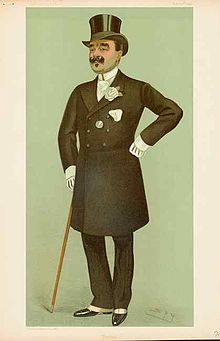|
Luís Pinto de Soveral, 1st Marquis of Soveral
Luis Maria Augusto Pinto de Soveral, Marquês de Soveral GCMG GCVO (28 May 1851 – 5 October 1922) was a Portuguese diplomat. Kaiser Wilhelm II nicknamed him "the Blue Monkey".[1] 
Barbara Tuchman, The Proud Tower, p.283, The Macmillan Company, New York City, 1962, available here https://archive.org/details/in.ernet.dli.2015.214565
 He was born at São João da Pesqueira, son of Eduardo Pinto de Soveral, 1st Viscount of São Luís, and his wife Maria da Piedade Paes de Sande e Castro.[2] Joining the diplomatic service, he was an attaché and Secretary of Legation at Vienna, Berlin, and Madrid.[3] He was First Secretary at the London Embassy in 1885 and advanced to the rank of Minister in 1891. He was a Counsellor of State, and served as Minister of Foreign Affairs from 1895 to 1897.[4] In 1897 he was made an Honorary Knight Grand Cross of the British Order of St Michael and St George,[5] and later that year was appointed Envoy Extraordinary and Minister Plenipotentiary to the Court of St James's.[4] Soveral was a friend of the Prince of Wales (later Edward VII) and a prominent member of the "Marlborough House set",[1] the group of aristocratic and other friends of Edward when Prince of Wales who were regarded as leading fashionable society, at a time when the royal court of Queen Victoria was sober and domestic in tone. He was Ambassador Extraordinary for Edward VII's coronation[4] and was made an Honorary Grand Cross of the Royal Victorian Order in 1902.[6] He was Ambassador Extraordinary to the Second Hague Conference in 1907.[4] His tenure as Portuguese Minister in London ended in 1910,[4] when the Revolution of 5 October overthrew the Portuguese monarchy. Soveral was created a Marquis by King Carlos I of Portugal in 1900, and was a Grand Cross of the Order of the Tower and Sword. He died at Paris. On his death, his title became extinct.[2] He is buried in the Pere Lachaise cemetery (Division 20),[7] in Paris. He was the subject of a biography by Paulo Lowndes Marques, entitled O Marquês de Soveral, Seu Tempo e Seu Modo (The Marquis of Soveral: his time and his manner).[8] References
|
